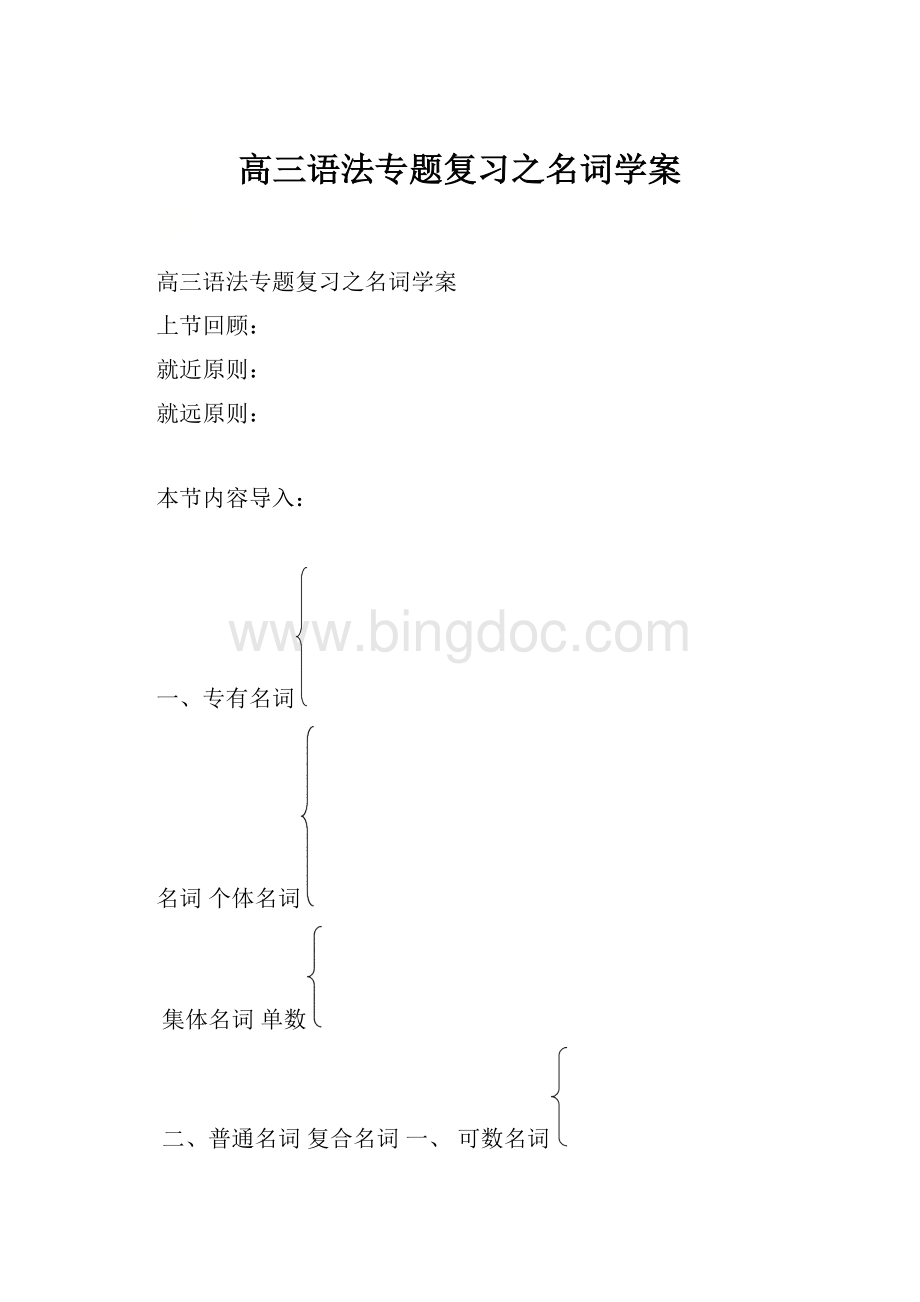高三语法专题复习之名词学案.docx
《高三语法专题复习之名词学案.docx》由会员分享,可在线阅读,更多相关《高三语法专题复习之名词学案.docx(22页珍藏版)》请在冰点文库上搜索。

高三语法专题复习之名词学案
高三语法专题复习之名词学案
上节回顾:
就近原则:
就远原则:
本节内容导入:
一、专有名词
名词个体名词
集体名词单数
二、普通名词复合名词一、可数名词
物质名词名词复数
抽象名词二、不可数名词
本节知识点讲解:
定义:
名词是表示人、事物、现象和其他抽象概念的名称的词。
一、可数名词变复数
1)一般情况下,直接加-s
例如:
book-booksbag-bagscat-catsbed-beds
2)以s.x.sh.ch结尾,加-es,读作【iz】
例如:
bus-busesbox-boxeswatch-watchesbrush-brushes
3)以“辅音字母+y”结尾,变y为i,再加-es.
例如:
family-familiesstrawberry-strawberrieslibrary-librariesdictionary-dictionaries
而以“元音字母+y”结尾,直接加s:
toy-toysmonkey-monkeys
4)以“f或fe”结尾,变f或fe为v,再加-es,
例如:
wife-wiveslife-livesself-selvesknife-knivesleaf-leavesthief-thieves
half-havesself-selvesshelf-shelvesloaf-loaveswolf-wolves等。
巧记忆:
勇敢的妻子(wife),拿了一把刀(knife),
自己(self)把狼(wolf)杀死了,救回小牛(calf)半(half)条命(life),
又把躲在葡萄架子(shelf)的叶子(leaf)中的小偷(thief)抓住了
也有直接加s的单词:
roof-roofsbelief-beliefsproof-proofschief-chiefs
5)以o结尾,大部分情况下直接加s,但是有特殊情况:
例如:
hero-heroestomato-tomatoespotato-potatoes(英雄爱吃西红柿和土豆)
piano-pianosphoto-photos
6)特殊变化的名词:
例如:
man-menwoman-womenpoliceman-policemenpolicewoman-policewomenmouse-mice(老鼠)child-childrenfoot-feettooth-teeth
7)单复数同形的名词:
例如:
fish鱼deer鹿sheep绵羊works(工厂)means手段
8)复合名词变复数通常是将其主要名词变为复数;
例如:
passer-by变为passers-by过路人
looker-on变为lookers-by旁观者
注意:
一些以man,woman结尾的合成词,在变复数时与man,woman的变化形式相同。
例如:
policeman/policemen(警察),Englishman/Englishmen(英国人)
9)不同国家的人的单复数
A.以-an结尾或其他形式结尾的表示民族、国家的人的名词变复数时在词尾加-s.
例如:
Americans,Asians,Russians,Australians,Italians,Germans等
B.特殊:
英国人和法国人要将man变为men
例如:
Englishman-EnglishmenFrenchman-Frenchmen
巧记:
中日瑞士不用变,英法国人man变men,其余一律加s
10)有一些名词只有复数形式:
trousers裤子pants裤子shorts短裤glasses眼镜compasses圆规scales天平
chopsticks筷子clothes衣服goods商品,货物contents目录sands沙滩
surroundings环境belongings财产earnings收入manners礼貌
11)集体名词的数
A.集体名词侧重于成员时,表示复数意义,不再变复数形式;侧重整体时表示单数意义
例如:
classfamilyteampublicarmygovernment
B.只表示复数意义的集体名词:
people人,人们police警察cattle牛
Thegroup______madeupofninestudents.
Thegroup______dancinghappily.
Theteam______somegoodplayers.
Theteam_______handsome.
Myfamilyabigone.AllmyfamilyinChinanow.
总结:
集体名词做主语,如果看成一个整体,谓语动词用单数形式,如果看成其中各个成员,谓语动词用复数形式。
12)名词作定语
作定语的名词通常用单数;
sport作定语时用复数
man和woman作定语时,其单复数根据被修饰词的单复数变化。
例如:
aboystudent—boystudents
abananatree→bananatreesashoefactory→shoefactories
sportsmeeting
巩固练习:
填入所给名词的正确形式:
1)Ihavetwo_____(knife)
2)Therearemany_____here.(box)
3)Therearemany_____ontheroad.(bus)
4)Afew_____aredrawingonthewall.(boy)
5)The_____areplayingfootballnow.(child)
请用括号中名词的复数形式填空:
1.Lookatthose_______.(child)
2.Icanseea__________standingnearthedoor.(policeman)
3.Doyouwantsome________fordinner?
(potato)
4.Inautumn,youcanseealotof_______ontheground.(leaf)
5.Hehastwo_______.Oneisblue,theotherisyellow.(box)
6.Two________liveinthisbuilding.(family)
写出下列单词的复数:
watch_________child_________photo________diary_________
day_________foot________book___________dress________
tooth_______sheep__________box__________strawberry_____
thief_______peach__________sandwich______man_________woman_________
小结:
二、常见不可数名词(必背):
advice(建议)fun(乐趣)homework(家庭作业)information(信息)sugar(糖)
fruit(水果)news(新闻)paper(纸)progress(进步)trouble(麻烦)furniture(家具)
traffic(交通)weather(天气)wealth(财富)work(工作)value(价值)
看似复数实际是不可数名词:
news新闻
politics政治
maths数学
physics物理
1.Nonews______goodnews.(be)
2.Ithinkmathsveryimportant.
注意:
一般说来,抽象名词、物质名词为不可数名词,但当它们表示具体的东西时,可用作可数名词且词义发生变化。
如:
抽象名词(不可数)
具体化(个体名词,可数名词)
insurprise惊讶地
asurprise一件令人惊讶的事
winsuccess获得成功
asuccess一个(件)成功的人(事)
winhonor赢得荣誉
anhonor一件引以为荣的事
byexperience靠经验
anexperience一次经历
youth青春
ayouth一个青年人
withpleasure乐意
apleasure乐事
havepityonsb.怜悯某人
apity可惜的事情
【典例6】改错:
Oh,John.Whatpleasantsurpriseyougaveus!
三、既可作可数又可作不可数的名词:
chicken小鸡/鸡肉
room房间/空间;位置
work作品/工作
paper论文;报纸/纸
glass玻璃杯/玻璃
time次;倍/时间
wood树林/木头
fish鱼/鱼肉
exercise练习/运动;锻炼
light灯/光
fruit(各种)水果/水果
四、名词的数量修饰语:
many/several
afew/few
quiteafew+可数名词
anumberof
manya+单数可数名词
much
alargeamountof+不可数名词
alittle(little)
some、any、enough、plentyof、alotof+可数or不可数名词
一)用some或any填空:
1.Icansee_____birdsinthetree.
2.Thereisn’t_____orangejuiceinmybottle.Pleasegiveme_____.
3.—Doyouhave_____picture-books?
—No,Idon’thave_____.ButIhave_____story-books.
4.—Isthere_____riceinthebag?
—No,thereisn’t_____.
5.—Arethere_____boysintheclassroom?
—No,butthereare_____girlsinit.
6.—WhichonecanItake?
—Youmaytake_____oneofthem.
7.—Wouldyoulike_____fruitjuice,please?
—No.I’dlike_____tea.
8.Ifyouhave_____questions,pleaseputupyourhands.
9.MayIaskyou_____questions,MissWang?
10.Canyousee_____bikesunderthetree?
小结:
二)afew/few/alittle/little练习题:
1.Thereis_______waterintheglass.Let'sgoandgetsome.
A.few B.much C.many D.little
2.Westillhave_______applesinthebasket.Youdon’thavetobuyany.
A.few B.afew C.little D.alittle
3.Iamnewhere.SoIhave_______friendshere.
A.few B.afew C.little D.alittle
4.I’m_______thirsty.CanIgetsomethingtodrink,mom?
A.few B.afew C.little D.alittle
5.Thereis_______moneyinmypocket,soIcan’tbuyanythingnow.
A.few B.afew C.little D.alittle
6.Hehas_______friendshere,hefeelslonely(孤独地).
A.few B.afew C.little D.alittle
7.Ienjoymylifehere.Ihave_______friendsandwemeetquiteoften.
A.few B.afew C.little D.alittle
8Thelakeisnotnear,sothereare_______peoplegoingswimmingthere.
A.few B.afew C.little D.alittle
9.Thetwinscanspeakonly_______French.
A.few B.afew C.little D.alittle
10.Let'sgoandhaveadrink.Westillhave_______timebeforethetrainleaves.
A.few B.afew C.little D.alittle
11.Pleasewaitjust_______minutes;I'mgoingtocleanmyselfup.
A.few B.afew C.little D.alittle
12._______peopleknowwherePhilliplives.Onlyhisparentscantellus.
A.few B.afew C.little D.alittle
13.Ladiesandgentlemen,Ihave_______wordstosay.
A.few B.afew C.little D.alittle
14.Canyougethere_______earliernexttime?
A.few B.afew C.little D.alittle
15.Nowbequietfor_______minutesandlistentothis.
A.few B.afew C.little D.alittle
16.Thereis_______inkinmybottle,canyougiveme_______ink?
A.few,afew B.little,alittle C.alittle,little D.alittle,alittle
小结:
三)toomuch(many)太多
toomuch修饰不可数名词,还可以用来修饰动词。
toomany修饰可数名词的复数形式。
muchtoo是“很、太”的意思,用来修饰形容词或副词。
例如:
Heshouldn’twalktoomuch.
Tomhastoomanybooksinhisroom.
Thiswatchismuchtoodear.
1.---Youshouldn'teat______meatbecauseit'sbadforyourhealth.
---Thanks.Andeatingalotwillmakemelook_______fat.
A.muchtooB.toomuchC.manytooD.toomany
2---Mum,thesoupis_______salty.
---Sorry,dear.I'veput_______saltinit,
A.toomuch;alotB.muchtoo;alotC.manytoo;alotofD.muchtoo;toomuch
3.Today,_____treesarestillbeingcutdownsomewhereintheworld.
A.muchtooB.toomuchC.manytooD.toomany
4.Look!
There's_____iceonthelake.
A.toomuchB.muchtooC.alotD.toomany
5.Thesweaterisverybeautiful,butit's_____dear.
A.toomuchB.muchtooC.manyD.more
6.Theseshoesaremuchtoo_____forme.
A.bigB.biggerC.biggestD.thebiggest
注意:
toomuch也可以作为名词,在句子中作主语或宾语。
如:
Toomuchwashappeningallatonce.
Youhavegivenmetoomuch.
小结:
四)不可数名词不能与数词连用,其数量需要借助一定的单位词表示:
1.借助表示“张”、“块”的单位词
apieceofpaper一张纸apieceofadvice一条建议
apieceofnews一条新闻apieceofchalk一支粉笔
2.借助表示容量的词
abottleofink一瓶墨水acupoftea一杯茶
abowlofrice一碗米饭aglassofbeer一杯啤酒
3.借助表示重量的词
akiloofsalt一公斤盐tentonsofcoal十吨煤
4.借助表示形状的词
adropofwater一滴水agrainofsand一粒沙
注意:
“apiece/pair+名词”之类的结构作主语时,其谓语通常与“piece/pair”的数保持一致。
例如:
Thereisapieceofbreadonthetable.桌子上有一片面包。
Therearepiecesofbreadonthetable.桌子上有几片面包。
总结:
如何表示不可数名词的量?
五、名词所有格
分类
构成及用法
例句
’s所有格
(表示人或其他有生命的东西的所有格形式)
不以s结尾的名词和以s结尾的单数名词在词尾直接加’s。
Tony’sstory汤尼的故事
theboss’svoice
以s结尾的复数名词在词尾加’。
thestudents’books
学生们的书
表示几个人共同拥有某人或物时,仅在最后一个名词词尾加’s;表示各自所有时,每个名词词尾都要加’s。
HelenandJane’smother
海伦和简的母亲
(两人共同的母亲)
Helen’sandJane’smothers海伦的母亲和简的母亲
(两人各自的母亲,两个母亲)
表示店铺、住宅、公共建筑等地点时,名词所有格后面的名词习惯上省略。
myaunt’s我姑姑家
thebarber’s理发店
表示具体的时间、距离、重量、价值、国家和城镇等无生命的名词,也可以加’s构成所有格。
aweek’stime一周的时间
China’spopulation
中国的人口
of所有格
表示无生命的东西的所有格形式。
thelegsofthedesk桌腿
双重所有格
of+’s所有格
adogofmyneighbor’s
我邻居的狗
of+名词性物主代词
afriendofmine
我的一个朋友
注意:
要特别记忆下列用to表示的所有格:
thekeytothelock,thekeytothedoor,thekeytothequestion,
theanswertothequestion,
thelid(盖子)tothebox
theentrancetothewedding
thesolutiontotheproblem
【典例精析】
1.My___________skirtisonthechair.
A.sisters’B.sisterC.sistersD.sister’s
2.—Whoseroomisthis?
—It’s___________.
A.LucyandLilyB.LucyandLily’sC.Lucy’sandLily’s
3.___________fatherscan’tgototheclassmeetingbecausetheyhavegonetobusiness.
A.JackandMike’sB.Jack’sandMike’s
C.JackandMikeD.Jack’sandMike
4.—Howfarisyourhomefromschool?
—It’sabouttwo___________walk.
A.hoursB.hours’C.hour’sD.hour